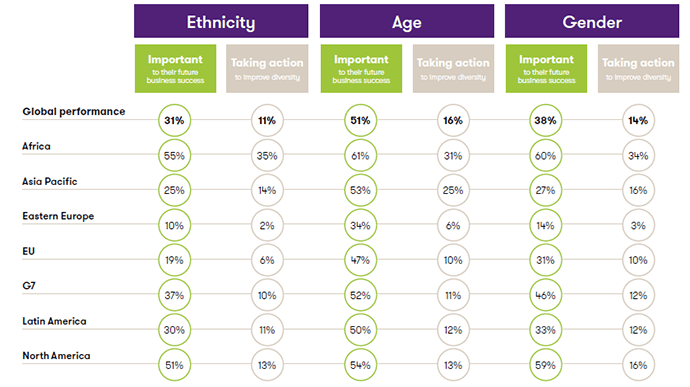
According to the findings of the latest Grant Thornton report “Diversity Snapshot: ethnicity, age and gender”, despite evidence that diversity gives businesses a competitive edge, many are still struggling to act.
The report captures the views of 2,500 businesses (among which 50 Italians) in 35 countries. It explores the diversity of senior teams by ethnicity, age and gender.
Europe scores the lowest results in all three categories. The reason? “Nowadays most companies, especially in Europe, limit themselves to adapt to social change, failing to anticipate or drive it. Furthermore, besides their display of interest, businesses are still not very much aware of the positive outcomes of diversity at all levels” explained Gabriele Labombarda in an interview with the newspaper Il Sole 24 Ore (read full article).
Only 31% of businesses see ethnic diversity as important to their success and just 11% have specific policies or initiatives in place to improve it. But businesses having diverse senior teams reflect more the ethnic diversity of some countries rather than a real will of the businesses.
“In our society – comments Gabriele Labombarda – ethnic diversity in leadership is still underrepresented, except for few cases, in which the choice is based on individual skills rather than on the will to diversify. Usually, foreign managers lead foreign companies opening a business in Italy, at least in the first year, so this can help spreading a greater acceptance of ethnic diversity”.
As concerns team age, 51% of surveyed businesses stated that it is important to have age diverse teams is important. Only one fourth (26%) of senior teams at global level, includes people over 64 and a similar percentage (24%) of businesses includes a 35-year-old (or younger) manager in their senior teams, most of all businesses operating in technology. “These percentages – specifies Labombarda – are certainly higher in Italy, as our entrepreneurial structure consists in family businesses where two or three generations often lead together”.
Lastly, just 38% of businesses consider gender diversity to be important, and only 14% are planning to take action in this area. “In Italy, changes in Boards were imposed by law (the so-called “Golfo-Mosca” law) and, however, the number of female business managers is still small, even in case of family business”. This is due to the continuous consideration of business as something “to be passed on from father to son, rather than from father to daughter, though women could bring the change in perspective that is needed to find new strategies for businesses that could lag behind the times”.

Simonetta La Grutta commented:
“Again this year, the results of the survey show that the cultural change that will lead to concrete and shared actions aimed at the actual implementation of diversity has been very limited. The more diverse a team is, the more specialties will develop, thus being aware of the plus contributed to the team, to the organization and to its growth in terms of operating, technical and managerial skills”.